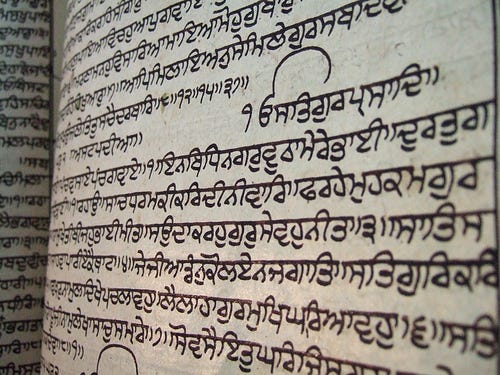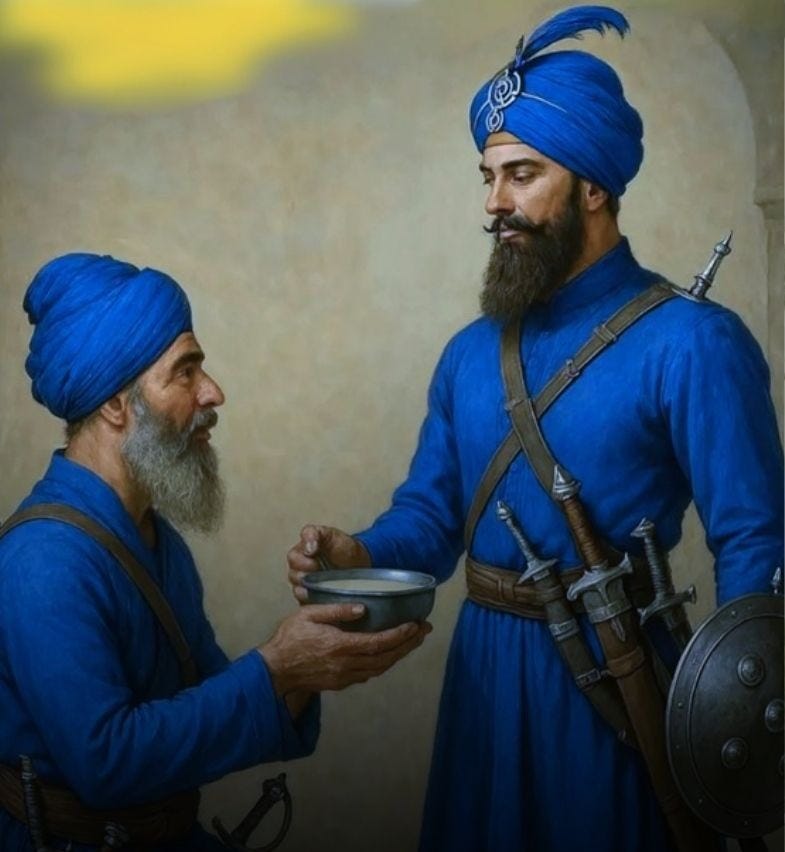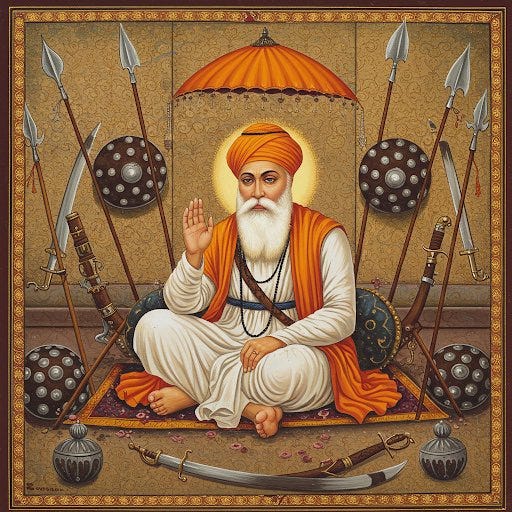Forward:
A miasma of fatalism afflicts the Sikhs today. The heirs of great warriors, and an even greater faith, are beset by the obsolete and erosive secular spirituality of modernists while their very identity is corroded by fallacious religions and inimical nation-states. The outcome is a foregone conclusion but prudency demands that we ask ourselves, is this the end of the Khalsa? Are the Sikhs to be reduced to just another footnote in history? Another relic of the bloody past in which, after the sword that allowed them to slaughter their way to power was rendered ineffectual, they lapsed into a modernist induced apathy? The Sikh cynics would argue that such is the fate of the Sikhs because this is Hukam or the divine will of Akal. But does this hold up as per the faith’s ethos?
Misinterpretation:
Beset by traditionalists more impressed with the Sanataan negation of human existence being false, rather than the Gurmat counterpoint it is real, and reformists plagiarizing off enlightenment atheistic utopian humanism it is a grave tragedy that our institutes lack a comprehensive and concurred upon simplification of the canonical Guru Granth. Professor Sahib Singh’s (1892-1977) humanistic attempt negates the centrality of Sikh identity and existence in practicing Gurmat by unwittingly falling for the canard that the Sikh doctrine does not pay heed to identity and is for everyone to follow irrespective of faith. The contradiction here, that is missed by his slavish missionary worshippers, is that the injunctions of the Guru Granth are solely for those who adhere to them.
Contrastingly the more older Faridkot Teeka, authored by Nirmala proponents, despite having identified inaccuracies and omissions has never been corrected and presents Gurmat as an appendage of the more older Sanataan philosophy. This, then, colors the reader’s comprehension of Sikhi and disallows them from appreciating the novelty of Khalsa mysticism in all its practical glory that is only attainable by actively living in this world and participating in all its joys and travails. What we then have are two distinct school of thoughts contending for the position of being the sole repository of Gurmat with neither being in close proximity to even catch a whiff of what Gurmat, in all its livable glory, truly is. One school portrays existence as nothingness; the other as a liberal utopia fest.
Superficial Readings:
Keeping in mind the tragic state of affairs that Sikh metaphysical intellectualism finds itself in today, it should be remembered that some concepts remain unchanged among the self-proclaimed reformists and traditionalists. Consider for example the following verse:
ਮਾਧਉ ਹਰਿ ਹਰਿ ਹਰਿ ਮੁਖਿ ਕਹੀਐ ॥
ਹਮ ਤੇ ਕਛੂ ਨ ਹੋਵੈ ਸੁਆਮੀ ਜਿਉ ਰਾਖਹੁ ਤਿਉ ਰਹੀਐ ॥੧॥ ਰਹਾਉ ॥
ਕਿਆ ਕਿਛੁ ਕਰੈ ਕਿ ਕਰਣੈਹਾਰਾ ਕਿਆ ਇਸੁ ਹਾਥਿ ਬਿਚਾਰੇ ॥
ਜਿਤੁ ਤੁਮ ਲਾਵਹੁ ਤਿਤ ਹੀ ਲਾਗਾ ਪੂਰਨ ਖਸਮ ਹਮਾਰੇ ॥੧॥
ਕਰਹੁ ਕ੍ਰਿਪਾ ਸਰਬ ਕੇ ਦਾਤੇ ਏਕ ਰੂਪ ਲਿਵ ਲਾਵਹੁ ॥
ਨਾਨਕ ਕੀ ਬੇਨੰਤੀ ਹਰਿ ਪਹਿ ਅਪੁਨਾ ਨਾਮੁ ਜਪਾਵਹੁ ॥੨॥੭॥੧੬੫॥
“Creator, your divine pervasiveness forever guides my speech. I am unable to perform anything, I reside as you keep me. What can one do alone? And how can one compel another to do something? Indeed, what is in the hands of this mortal creature? As you orient us, so we tread because you are our divine overlord. Master of all that exists, grace us with your divine munificence that only your true form remains alluring to me. Nanak has but this supplication alone, let me imbue the all-pervasive one’s wisdom repeatedly.”
-Guru Granth, 216.
An initial reading gives the impression that the verse is indeed emphasizing predestination and that Hukam is totalitarian divine will guiding the minute-to-minute, second-to-second conduct of man. However, such a superficial conclusion would be erroneous. Preceding verses speak of ascetics and renunciates ignoring the genuine path of Naam (or the divine wisdom) to pursue false inducements and suffering the resulting consequences delineating the existence of free will. Why then this pessimistic verse? The mystery is unlocked when one acknowledges that the verse elaborates upon the inability of man to alter the existential foundations of creation impacting his life-the parameters of reality we all reside under but are unable to change. This is the crux of the verse.
However, reading the simplifications of reformists and traditionalists breeds a pessimistic outlook that negates belief in free will. Naturally, when one comes to verses emphasizing free will and highlights the seeming contradiction no concise answers are forthcoming. Traditionalists, in their time-honored fashion, provide convoluted hagiographies to muddy waters further while reformists attempt to argue philosophical scientificism but instead fall flat on their face given that they fail to hit the heart of the matter: why their exegetical attempts reflect the contradictions and failings of their traditionalist opponents. The logical answer here is that neither side seems to have a basic grasp of Sikh theology and are only massaging their respective egos. Predestined? Only by the burden of stupidity.
One’s Own Fate:
The parameters of reality, of our very existence, are preset by the Creator and unalterable. This still leaves man a master of his own fate. His destiny is decided by he himself alone and none other. If he selects to tread the path of Gurmat, he has to evolve his consciousness and physical being into that of a warrior-saint prepared to combat the tyranny of an ignorant world. If he lapses into self-willed ignorance and remains bestial, he regresses into a Manmukh and suffers certain annihilation post-death or physical annihilation at the hands of the Gurmukh Khalsa. The contours of his destiny are charted by he himself within the confines of reality. This is Hukam or divine writ. But what destiny will he adopt? Once again, his prerogative of exercising free will to make his choice is Hukam or divine writ. Not a totalitarian preprogrammed decision.
ਰੈਣਿ ਗਵਾਈ ਸੋਇ ਕੈ ਦਿਵਸੁ ਗਵਾਇਆ ਖਾਇ ॥
ਹੀਰੇ ਜੈਸਾ ਜਨਮੁ ਹੈ ਕਉਡੀ ਬਦਲੇ ਜਾਇ ॥੧॥
ਨਾਮੁ ਨ ਜਾਨਿਆ ਰਾਮ ਕਾ ॥
ਮੂੜੇ ਫਿਰਿ ਪਾਛੈ ਪਛੁਤਾਹਿ ਰੇ ॥੧॥ ਰਹਾਉ ॥
ਅਨਤਾ ਧਨੁ ਧਰਣੀ ਧਰੇ ਅਨਤ ਨ ਚਾਹਿਆ ਜਾਇ ॥
ਅਨਤ ਕਉ ਚਾਹਨ ਜੋ ਗਏ ਸੇ ਆਏ ਅਨਤ ਗਵਾਇ ॥੨॥
ਆਪਣ ਲੀਆ ਜੇ ਮਿਲੈ ਤਾ ਸਭੁ ਕੋ ਭਾਗਠੁ ਹੋਇ ॥
ਕਰਮਾ ਉਪਰਿ ਨਿਬੜੈ ਜੇ ਲੋਚੈ ਸਭੁ ਕੋਇ ॥੩॥
ਨਾਨਕ ਕਰਣਾ ਜਿਨਿ ਕੀਆ ਸੋਈ ਸਾਰ ਕਰੇਇ ॥
ਹੁਕਮੁ ਨ ਜਾਪੀ ਖਸਮ ਕਾ ਕਿਸੈ ਵਡਾਈ ਦੇਇ ॥੪॥੧॥੧੮॥
“Nights are forefeited in sleep, and days are spent gorging. The (human) life is a diamond but the ignorant gamble it away like a shell. The divine wisdom of the all-pervasive Creator is ignored while alive, and when death finally arrives then all that is left is bitter regret. The fools horde countless treasures, while on this earth, but nothing accompanies them in the end. Those who depart at the end for their final home, they never return and their treasures go to waste. If all concerned could accumulate such wealth with ease then would everyone not be fortunate? But our destiny unfolds based on our actions even if thousands pray otherwise. Nanak, the Creator creates and cares for what is created. How can the reasons behind the divine will be known? Only some are blessed with glory.”
-Guru Granth, 156-157.
Our fate is in our own hands. Our destiny unfolds based on our actions. There are countless individuals who wish it otherwise, who pray for divine intervention to ease the burden of existence. But the reality (ironically), the divine writ, is that we have been empowered to either ease our own burdens or increase them further depending on our aims and ambitions. Thus there is no room for cynicism or pessimism in either the Sikh ethos or praxis. The Khalsa is the master of its own destiny. As the apex of Sikh mysticism, the Khalsa comprehends that it reaps what it sows. This acceptance eases its passage through life’s turmoil. One can discern this liberating and joyful acceptance of mastering one’s own fate in the lives of our forefathers. To rise phoenix like from the ashes was a choice, not predestined.
Preparation:
An apocryphal tale runs that King Canute was once told by his flatterers that even nature bowed to his regal glory. The King had them convey him to a shore and set his throne by the water. He then commanded the water to refrain from wetting his feet. The water did what it had for eons. It crashed against the shore and wet his feet. Nature did not give two damns about his majesty, throne and all. There are indeed forces outside our control. And while these forces define our existence-what we can and cannot do existentially-they do not define us. Man’s sojourn on earth so far substantiates this. Our limits do not define us but empower us. This is a fundamental cornerstone of the Sikh ethos: to transform adversity into advantage. But the myth of mortal helplessness afflicted by providence persists.
But inaction, as veteran warrior Stanley McChrystal aptly summarizes it, is nothing more than a dodge. Just because the next eventuality is unknown, it should not prevent us from preparing for it. Just because a worthwhile goal might be unreachable, it should not prevent us from reforming ourselves to attain it. Preparation, in itself, instills confidence in us while breeding discipline even in the face of the unknown. To concede hope and a passion for existence-for living-due to misinterpretations of the Guru Granth and the vagaries of old fools is the height of imbecility. There are aspects of life we cannot escape, but this does not negate the passion required to confront its trials and prepare for them. These trials consist the gauntlet that furnishes our path to immortality after our demise.
ਜਿਨੀ ਨਾਮੁ ਧਿਆਇਆ ਗਏ ਮਸਕਤਿ ਘਾਲਿ ॥
ਨਾਨਕ ਤੇ ਮੁਖ ਉਜਲੇ ਕੇਤੀ ਛੁਟੀ ਨਾਲਿ ॥੧॥
“Those who imbue the divine wisdom run the gauntlet of life. Nanak, their faces are beatifically lit and they liberate both themselves and those who tread with them as well.”
-Japji.
Conclusion:
The optimism signified by the Sikh recourse of Chardi Kalah or ascendant spirits encapsulates the upbeat nature of the Sikh Gurus. This same upbeat nature is imbibed by the Khalsa as the physical embodiment of the principles enshrined in the Guru Granth. Obsolete traditionalists and mentally addled reformists cannot shake it. It is high time that they be reminded of its potency and be sent packing on their way. True autonomy lies in living life passionately. Not in stewing it away in cynicism.







Someone really needs to write a comprehensive volume on Sikh theology with proper Gurmat translations.